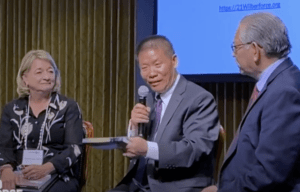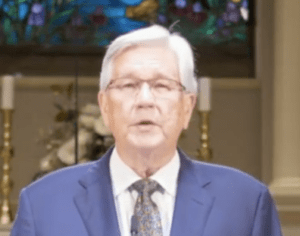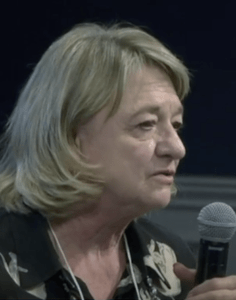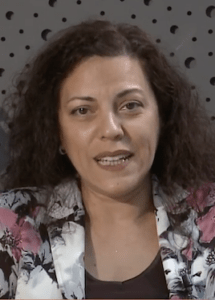The 122nd global gathering of the Baptist World Alliance begins July 8 — a year later than originally planned and online due to the continuing effects of the COVID-19 pandemic.
BWA announced the virtual version of its three-day World Congress will feature more than 3,500 Baptists from at least 130 nations attending an array of global ministry forums and discussion groups, Bible studies, worship and fellowship assemblies.
Originally scheduled to be held in Rio de Janeiro in July 2020, the quinquennial event was postponed by one year in the hope it could be staged in-person until the continuing coronavirus outbreak forced the move online.
This week’s gathering was preceded on July 7 with pre-conference seminars and plenary sessions, including a day-long series of workshop and panel discussions covering the global Baptist experience with persecution, religious freedom and advocacy.
Religious freedom activism

Suzii Paynter March, Bob Fu, Gus Reyes
An afternoon session featuring China Aid founder and author Bob Fu, former Cooperative Baptist Fellowship Executive Coordinator Suzii Paynter March and Texas Baptist Christian Life Commission Director Gus Reyes offered guidance to individuals and churches called to religious freedom activism locally, nationally or internationally.
Fu, who once was imprisoned in his native China after the infamous Tiananmen Square massacre in Beijing, told how persecution led him to become a Baptist who struggles for the religious liberty of others, even non-Christians.
“God knows that was a tragic moment on June 4, 1989, but out of that tragic massacre God has started the greatest spiritual revival among the Chinese intellectuals,” he reported.
China recently began to push back on this revival by embarking on one of the most severe episodes of religious persecution since the Cultural Revolution of the 1960s and 1970s, Fu said. Churches are being closed, and Christians are being imprisoned, killed or forced to sign statements denouncing their faith.
Americans should not take for granted their rights to worship as they wish, he added. “Religious freedom for all — not only for Christians. Isn’t that the witness of the Lord?”
Motivated by faith
Session moderator Randel Everett noted that advocacy must be motivated by faith if oppression is to be overcome.

Randel Everett
“If we are going to be about systemic change, if we are going to overcome evil, oppressive systems or laws, then first of all it has to be a spiritual renewal, it has to be a renewal of the heart,” said Everett, president of the Christian human rights organization 21Wilberforce and a former executive director of the Baptist General Convention of Texas.
Christian advocacy depends not only on the know-how of its participants but also on their dependence on divine inspiration, said March, who served as director of the Texas Christian Life Commission before her leadership role with CBF. “This is another principle of Christian advocacy: Do your part and ask the Lord all the while to bless you.”
Congregational and other faith leaders called to advocacy work can show the way by working beyond church walls to serve in communities and civic systems, she said.
And advocacy should be viewed as a form of missions work, whether it is in food, preschool, clothing or other ministries. “Let that be the beginning of advocacy in your congregation because your people care about the root causes of those issues.”

Suzii Paynter March
Discernment, community engagement and avoiding political pitfalls also are crucial, March added. “This is a long-term investment, a long-term presence. It’s learning the language, the culture, showing respect to those who make decisions and bearing witness to Jesus Christ.”
Reyes said Christians must develop thick skins if they are going to venture into city halls and statehouses seeking change. “The authorities will respond but maybe not in the way you want. You either get to celebrate or you have to go back and make more strategies.”
Power in unified purpose
An earlier July 7 session began with a reminder from Everett of how influential Baptists can be when they are unified in purpose.
They were instrumental in 1945 when more than 100,000 Baptists signed a petition urging wide-ranging religious liberties be included in the charter of the then-emerging United Nations, he said. “Religious freedom is not new for Baptists. It’s a foundational belief that we have championed for 400 years.”
Everett said Baptists also have opposed active religious persecution, including in 1939 when then-BWA President George W. Truett said Baptists are compelled to stand up for the rights of their neighbors, regardless of religious affiliation, and declared that “for any person or institution to dare come between the soul and God is a blasphemous impertinence. Tolerance is a gift from man, but liberty is a gift from God.”
Likewise, the 2021 BWA gathering is intended as an opportunity for Baptists to speak and pray as one voice on the foundational human right of religious freedom, he said.
Examples of success
In a session titled “How Baptists are Standing Together,” panelists shared illustrations of how Baptist unity and cooperation have contributed to religious and even democratic freedoms in modern contexts.

Shane McNary
“When we talk about religious freedom for all and what advocacy should look like, it grows from the grassroots,” said Shane McNary, who serves as Cooperative Baptist field personnel in Slovakia and Czech Republic. “It is not a top-led engagement in advocacy efforts because too often things can be done that are disconnected from life on the ground — if you will, from the local church.”
Organizations like BWA and the European Baptist Federation take their lead from local individuals and churches, a process that makes those global and regional organizations more effective advocates with the U.N., international and local governments and other religious groups, McNary said.
He cited a successful effort to negotiate for more religious freedoms for Christians in Azerbaijan. McNary and other representatives of the federation, at the invitation of local Baptists, were able to win limited authorization for Christians to gather for worship. “It was not full, open permission, but it was more than what they had before. And it was hearing from them that was important.”

Dimitrina Oprenova
Dimitrina Oprenova, a Baptist minister and former vice president of BWA Bulgaria, told how a 2018 government proposal to severely limit religious freedoms was met by an overwhelming global backlash that was stoked by local and international religious groups, including BWA.
“The results were obvious. On Dec. 21 (2018), many of those problematic provisions were pulled out,” Oprenova said. “Due to efforts in and out of the country, a huge overturn of the plan took place.”
A unified Baptist and Christian body can bring amazing change, even to governments, she said. “No state is an island, and we all need one another’s support for God’s kingdom to grow in every country around the world.”


